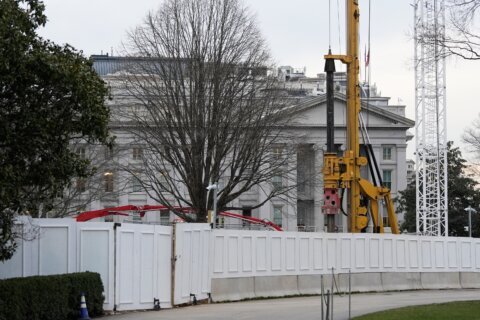Commerce Secretary Gina Raimondo won’t hesitate to make the hard ask. She wants to make that clear.
There may be, after all, nothing less than the fate of President Joe Biden’s sweeping $4 trillion economic agenda hanging in the balance in the weeks ahead.
But in an interview in her office a few blocks down the street from the White House, the former Rhode Island governor laid out a distinctly old-school — and bipartisan — relationship-building process that has made her what White House officials view as a key asset in the effort to lay the groundwork for the high-wire legislative process that lies ahead.
It’s a process, at least to this point, that’s a lot less about twisting arms, and a lot more about Maine lobsters. Or the Alaskan cruise industry. Or broadband access in rural Mississippi.
“Legislators deserve respect. They deserve to be listened to. They go back every week to their districts, and they have to be held to an accounting by their constituents,” Raimondo said. “And I just really respect that.”
The approach is one that echoes the view of her boss, a 36-year veteran of the Senate.
Biden made clear, throughout the roller-coaster negotiations over a bipartisan infrastructure package, that he viewed a deal with Republicans as not just crucial to his broader legislative agenda but also as an important signal to the country — and world — that the US government can actually produce an outcome.
Biden’s approach drew criticism from some congressional Democrats, wary of wasting valuable time pursuing a deal that may never come to fruition or securing one that would jettison key Democratic priorities.
To this point, however, with the bipartisan framework in hand, things remain on the ever-tenuous track Biden has laid out.
Raimondo plans to do her part to keep it that way.
Outreach to key senators
To be clear, Raimondo oversees a sprawling portfolio at the Commerce Department with no shortage of domestic and international issues to manage.
But she’s become a key administration contact for Sen. Susan Collins, the moderate Maine Republican — a member of the bipartisan group that put together the infrastructure deal and a key vote who has at various points raised concerns about the approach of Biden’s senior advisers.
Collins and Raimondo formed a relationship over a critical issue for her state: the lobster industry. Collins asked Raimondo to dig into the issue before deploying new regulations. Raimondo did just that — and the two have stayed in contact.
“I’ve always admired her and her willingness to go against her party on things she believes in,” Raimondo said of her fellow New Englander.
When Alaska’s Republican senators urgently worked to address potentially devastating economic fallout tied to Covid and cruise industry regulations, Raimondo had her team stress the vital role the industry played for the state and local communities. It helped propel legislation, spearheaded by Alaska’s delegation, to address the issue in a matter of weeks.
“I did that because it’s the right thing to do for the people of Alaska,” Raimondo said.
“I also plan to squeeze them as hard as possible to vote for the bipartisan package,” she added, referring to Sens. Lisa Murkowski and Dan Sullivan. “Because that’s also the right thing to do.”
She traveled to Mississippi with Sen. Roger Wicker, the top Republican on the Senate Committee on Commerce, Science, and Transportation, to talk rural broadband — and press him to support the bipartisan plan.
His response? “Well, you know, it’s a process,” Raimondo said with a smile.
The efforts aren’t limited to Republicans. Raimondo will be on the road to Washington state for an event with Democratic Sen. Maria Cantwell. She’s traveled to Massachusetts for an event with Sen. Ed Markey, a key progressive voice.
And then there was the dinner with her husband and Sen. Joe Manchin on the West Virginia Democrat’s houseboat (asked how the roughly five-hour experience went, Raimondo replied: “A great deal of scotch”).
For Raimondo, it’s an effort she says comes from her time as governor, noting it’s virtually impossible to get anything done in that role without productive relationships with legislators.
Even prior to the latest agenda push, she’d had a key supporting role in the legislative drive to secure $52 billion to boost domestic semiconductor manufacturing — a critical effort given the pervasive chip shortages that have plagued industries for months and served as an urgent economic and national security priority for Raimondo and her team at Commerce.
Raimondo is still engaged on the legislation, which has bipartisan support, but differences between House and Senate versions remain. She said she’s confident they will be reconciled given the urgency of the issue — and spoke to Speaker Nancy Pelosi about the issue just the other day.
“I think people realize this is a must-do bill,” she said.
But Biden specifically deputized his Cabinet secretaries as he rolled out his signature recovery packages — the $2.3 trillion American Jobs Act and the $1.8 trillion American Families Plan — to bolster his team’s efforts to sell the proposals.
Split into two councils — aptly named the Jobs Cabinet and the Families Cabinet — Biden’s Cabinet has served as a messaging multiplier of sorts through dozens of events around the country and media appearances.
The department heads have regular calls and specific assignments doled out by the White House, primarily tied to policy initiatives in Biden’s dual proposals that line up with the areas of expertise for their respective teams and agencies.
For Raimondo, officially a member of the Jobs Council, that means broadband. The bipartisan agreement reached last month includes $65 billion to expand high-speed broadband access to unserved areas.
But she’s been on the phone with Pelosi and Democratic Rep. Rosa DeLauro of Connecticut on the $400 billion that Biden proposed for home-based care for elderly people and those with disabilities, an issue she worked on as governor. She makes the same pitch to the CEOs she speaks to nearly daily.
Connections to top Biden aides
The work behind the scenes with lawmakers has become a key, if unofficial, part of her portfolio. She’s not a member of Biden’s lead negotiating team or legislative team, but she has become a resource beyond her department’s technical policy expertise.
It’s an element that has given her close access to Biden’s tight-knit senior team, a level of currency in and of itself.
She calls Ron Klain, Biden’s powerful chief of staff, “super accessible.” Steve Ricchetti, one of the President’s closest advisers and lead negotiators, “calls you back in a minute and he’s really in the thick of all these relationships.” Anita Dunn, senior adviser to Biden, “is there whenever you need her.” Raimondo works closest with Brian Deese, the National Economic Council director, given the overlap of their portfolios.
“I feel like we’re working as a team,” Raimondo says.
She makes clear that it’s Biden’s explicit directive that has driven her outreach efforts to Republicans — one that he hasn’t hesitated to repeat in conversations with Cabinet secretaries and senior staff over the last few months.
Biden’s push behind the scenes, according to Raimondo, has ranged from “Try harder, have more conversations” to “Who should I call? How do we get this done?”
The latter question is perhaps the question driving Democrats on both sides of Pennsylvania Avenue these days. The bipartisan agreement was a key step to keeping the dual-track process that Biden and Democratic leaders on Capitol Hill have sketched out.
But there is more work to be done to actually draft that agreement, move it through each chamber and, of course, have the votes to get it passed. The second piece — one Democrats acknowledge won’t get Republican votes and is expected to be composed of central priorities for progressives — also needs to move on a relatively similar timeline.
In other words, it remains a high-wire act with no shortage of potential pitfalls likely to present themselves in the weeks ahead, and the stakes couldn’t be higher.
As Raimondo succinctly described what could viewed as her unofficial mandate: “Find bridges. Overcome obstacles. We’ve gotta deliver.”







